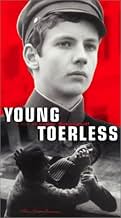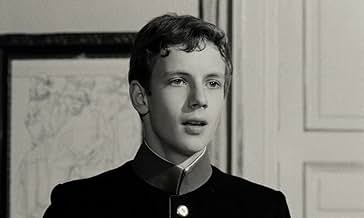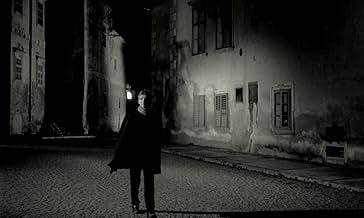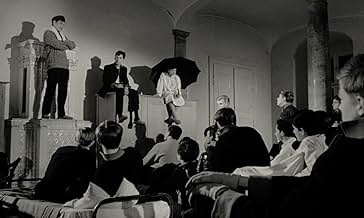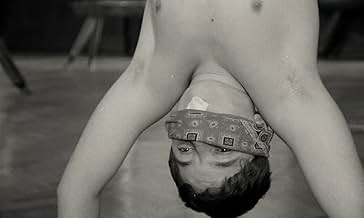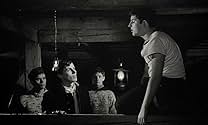NOTE IMDb
7,2/10
2,8 k
MA NOTE
Ajouter une intrigue dans votre langueIn a boarding school, a student observes in passive disgust as his two friends manipulate, humiliate and torture a fellow student, justifying their every act.In a boarding school, a student observes in passive disgust as his two friends manipulate, humiliate and torture a fellow student, justifying their every act.In a boarding school, a student observes in passive disgust as his two friends manipulate, humiliate and torture a fellow student, justifying their every act.
- Réalisation
- Scénario
- Casting principal
- Récompenses
- 4 victoires et 1 nomination au total
Avis à la une
Young Toerless is some kind of whizz kid,ahead of his time.Played by the phenomenal Matthieu Carrière -who was only 16 at the time;I 'm looking for another actor ,able to play such an intellectual part,at such an early age!-He worries about imaginary(complex) numbers.For him,a square is positive,so the existence of such numbers (the square root of -1 can be i or -i)eludes him.He admits they are useful in geometry(rotations,similitaries)or trigonometry or even to build bridges,but he 's got to admit it without understanding the mathematical concept(You'll find out when you know ten times more in maths,the teacher says)During the movie,he will discover that a lot of things in life have to be admitted without a proof.
The film takes place in an old secondary school,in Austria,at the beginning of the 20th century,while Francis Joseph-whose photographs are pinned everywhere- was still the regnant emperor .This is the end of an era ,1914 is not far away. An iron discipline,students in uniform,the necessary and sufficient condition for the emergence of oppressors and their punching bag.
Two students choose one of their mates as a victim (to make up for their frustrated sexuality,because of a latent homosexuality?Ascene in which they're looking at erotic photographs is telling)And not the first to come!Someone different.Only difference can lead to inferiority. The poor lad stole some stuff,and now his mates can threaten him to reveal the whole thing to the teachers if...
So begin more and more sadistic scenes,culminating with the one at the gymnasium(A symbol : a punch bag is generally a sport outcast) where almost everyone inflicts moral and physical tortures on him.The former is the most humiliating:one of the cowards reads a letter from the unfortunate boy's mother,a widow sometimes unable to make ends meet-all the others are very rich kids-,making a fool of her.
And Toerless?He's primarily a spectator.Not exactly a peeping tom,but someone who uses the whole school,and its particularities,as an experiment behind closed doors.Evil exists as imaginary numbers do,we have to cope with it,even if we cannot understand its source.He will not intervene to help his neighbor,worse,he will shun the sound and the fury,which may infuriate many people who watch this movie.Actually,for Toerless, and for the teachers-who do not seem to be that much angry when they discover the horrible things that happen behind their walls,they are worthy forerunners of Nazis who thought the feeble ,the sick and the "different" one had to be eliminated-,the punch bag story is almost an abstract fact,which they intellectualize to a fault.
Matthieu Carrière has never made the career he deserved."Die jungeToerless" is not exactly an entertaining movie,but if you are looking for something different,this might be your cup of tea.
The film takes place in an old secondary school,in Austria,at the beginning of the 20th century,while Francis Joseph-whose photographs are pinned everywhere- was still the regnant emperor .This is the end of an era ,1914 is not far away. An iron discipline,students in uniform,the necessary and sufficient condition for the emergence of oppressors and their punching bag.
Two students choose one of their mates as a victim (to make up for their frustrated sexuality,because of a latent homosexuality?Ascene in which they're looking at erotic photographs is telling)And not the first to come!Someone different.Only difference can lead to inferiority. The poor lad stole some stuff,and now his mates can threaten him to reveal the whole thing to the teachers if...
So begin more and more sadistic scenes,culminating with the one at the gymnasium(A symbol : a punch bag is generally a sport outcast) where almost everyone inflicts moral and physical tortures on him.The former is the most humiliating:one of the cowards reads a letter from the unfortunate boy's mother,a widow sometimes unable to make ends meet-all the others are very rich kids-,making a fool of her.
And Toerless?He's primarily a spectator.Not exactly a peeping tom,but someone who uses the whole school,and its particularities,as an experiment behind closed doors.Evil exists as imaginary numbers do,we have to cope with it,even if we cannot understand its source.He will not intervene to help his neighbor,worse,he will shun the sound and the fury,which may infuriate many people who watch this movie.Actually,for Toerless, and for the teachers-who do not seem to be that much angry when they discover the horrible things that happen behind their walls,they are worthy forerunners of Nazis who thought the feeble ,the sick and the "different" one had to be eliminated-,the punch bag story is almost an abstract fact,which they intellectualize to a fault.
Matthieu Carrière has never made the career he deserved."Die jungeToerless" is not exactly an entertaining movie,but if you are looking for something different,this might be your cup of tea.
The movie won an award at the Cannes Film Festival when it was first released and signaled the beginning of a German cinematic revival. The book was written in 1906 and is a tedious read, although thankfully a short book. Homosexuality plays a large role in the book but virtually does not exist in the movie. Torless, a horny teenager in an all boys school, eventually has a torrid sexual affair with one of the students. The movie chooses to ignore this, and maybe for good reason as it was released in I believe in 1966. Filmed in black and white, the lack of color contributes to the atmosphere of German austerity that director uses to his advantage. The final speech by Torless is a brilliant defense for the lack of opposition by the middle class to the rise of Hitler. Most of the teenagers in the movie were not aspiring actors but were chosen almost at random for their roles. But considering the time in which it was produced this is a land mark film, especially for German cinema. The movie is much more entertaining than the book and the director,Volker Schlondorff, did a fabulous job and deserves the awards it was given.
Young Törless is a pertinent reflection on good and evil and the way an individual behaves, given the lack of values in others.
In comparison with the moral and ethical values required by institutions, human behavior seems to follow an errant, amoral path, simply determined by chance, or the current of events. Especially when manifested in a group, human beings lose any values and act according to the tide. They practice excesses and suffer humiliations instinctively, as if they were a fatality of life.
The few who show the courage to remain faithful to fundamental values are marginalized, seen as outsiders, labeled as dreamers.
Being a German film from 1966, it is impossible not to relate this criticism to the rise and fall of Nazism, just 21 years earlier.
A film in which Volker Schlöndorff puts a finger on the wound of Nazism, still open in German society, and forces his compatriots to reflect on the mistakes of the past.
In comparison with the moral and ethical values required by institutions, human behavior seems to follow an errant, amoral path, simply determined by chance, or the current of events. Especially when manifested in a group, human beings lose any values and act according to the tide. They practice excesses and suffer humiliations instinctively, as if they were a fatality of life.
The few who show the courage to remain faithful to fundamental values are marginalized, seen as outsiders, labeled as dreamers.
Being a German film from 1966, it is impossible not to relate this criticism to the rise and fall of Nazism, just 21 years earlier.
A film in which Volker Schlöndorff puts a finger on the wound of Nazism, still open in German society, and forces his compatriots to reflect on the mistakes of the past.
Faithfully adapted from author Robert Musil, this study of sadism and masochism among students at an Austro-Hungarian boys prep school is a parable of fascism and its origins. Barbara Steele is radiant and splendid as Bozena the prostitute who awakens the nascent sexual nature of the adolescent students. Lovingly photographed in black and white, YOUNG TORLESS evokes the mood and claustrophobic horror of the dehumanizing military system. Matthew Carriere gives an unblemished and heartfelt performance as an innocent caught behind the barbed wire walls of his very soul and the duty to which he has been placed. A must-see for everyone and an advocacy for pacificism. This was Volker Schloendorff's first film, and by admission one of Barbara Steele's favorite roles.
Considered a classic film as it was the first film to put the then New German Film firmly on the (international) map. Also a classic because it was Schlöndorf's first feature and it is still thought highly of. To be sure, this is a beautiful film to watch with its superb black-and-white cinematography; Schlondörf's direction makes it into a well paced and staged, stylish film. But I never liked the film; recent re-viewing confirmed my feelings.
Schlöndorf wants to do more than simply bring the viewer the subject and with that the whole thing goes wrong. In trying to convey the deeper meaning of the story as clear as possible the script is written in such way that even the most simple minded can not miss it. The film is lecturing without any subtleties; Schlöndorf never provokes the viewer to think for himself: he has already done it for him. Nor is there any nuance in the psychology of the different characters.
And what about the cast? In 1966 (and still) praised for their effort as inexperienced actors. Well, I think that most of the acting is downright poor, or never goes further than reciting lines. In the meantime we have come to know Mathieu Carriere better during his career; Carriere is in this his first film as boring as he still is. Of course the actors were not helped much by the literary dialogue, another feature that was (and is) praised so much; most of it I find simply laughable. Classic miscast is Barbara Steele, who seems to have walked in from the set of a typical sexploitation film, including acting style.
Schlöndorf wants to do more than simply bring the viewer the subject and with that the whole thing goes wrong. In trying to convey the deeper meaning of the story as clear as possible the script is written in such way that even the most simple minded can not miss it. The film is lecturing without any subtleties; Schlöndorf never provokes the viewer to think for himself: he has already done it for him. Nor is there any nuance in the psychology of the different characters.
And what about the cast? In 1966 (and still) praised for their effort as inexperienced actors. Well, I think that most of the acting is downright poor, or never goes further than reciting lines. In the meantime we have come to know Mathieu Carriere better during his career; Carriere is in this his first film as boring as he still is. Of course the actors were not helped much by the literary dialogue, another feature that was (and is) praised so much; most of it I find simply laughable. Classic miscast is Barbara Steele, who seems to have walked in from the set of a typical sexploitation film, including acting style.
Le saviez-vous
- AnecdotesLuchino Visconti had previously tried to set up a version of " Young Torless " with Romy Schneider starring.
- Citations
Thomas Törless: Yet another day to tell our grandchildren about.
- ConnexionsFeatured in Film Review: International Films (1968)
Meilleurs choix
Connectez-vous pour évaluer et suivre la liste de favoris afin de recevoir des recommandations personnalisées
- How long is Young Törless?Alimenté par Alexa
Détails
- Date de sortie
- Pays d’origine
- Langue
- Aussi connu sous le nom de
- Young Törless
- Lieux de tournage
- Eggenberg Palace, Graz, Styrie, Autriche(military school)
- Sociétés de production
- Voir plus de crédits d'entreprise sur IMDbPro
- Durée1 heure 27 minutes
- Couleur
- Mixage
- Rapport de forme
- 1.66 : 1
Contribuer à cette page
Suggérer une modification ou ajouter du contenu manquant

Lacune principale
What is the Spanish language plot outline for Les désarrois de l'élève Törless (1966)?
Répondre
